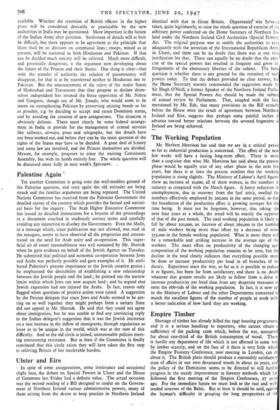Ulster and Eire
• In spite of some exaggerations, some irrelevance and occasional slight heat, the debate on Special Powers in Ulster and the House of Commons last Friday had a definite value. The actual occasion was the second reading of a Bill designed to confer on the Govern- ment of Northern Ireland various administrative powers, many of them arising from the desire to keep practice in Northern Ireland
identical with that in Great Britain. OppornmittiVal-1)6wever taken, quite legitimately, to raise the whole question of exercise of the arbitrary power conferred on the Home Secretary of Northern Ire- land under the Northern Ireland Civil Authorities (Special Powers) Act. The original purpose was to enable the authorities to cope adequately with the terrorism of the International Republican Army in Ulster, and there can be no doubt that there was at one time justification for that. There can equally be no doubt that the exer- cise of the special powers has resulted in frequent and gross in- fringements of the elementary liberties of the subject. The basil question is whether there is any ground for the retention of suet powers today. To that the debate provided no clear answer, bit the Home Secretary warmly commended the • suggestion made by Sir Hugh O'Neill, a former -Speaker of the Northern Ireland Parlia- ment, that the Special Powers Act should be made the subject of annual review by Parliament. That, coupled with the fact, mentioned by Mr. Ede, that many provisions in the Bill actually before the House were the result of agreement between Northern Ireland and Eire, suggests that perhaps some painful inches d advance toward better relations between the severed fragments d Ireland are being achieved.


































 Previous page
Previous page